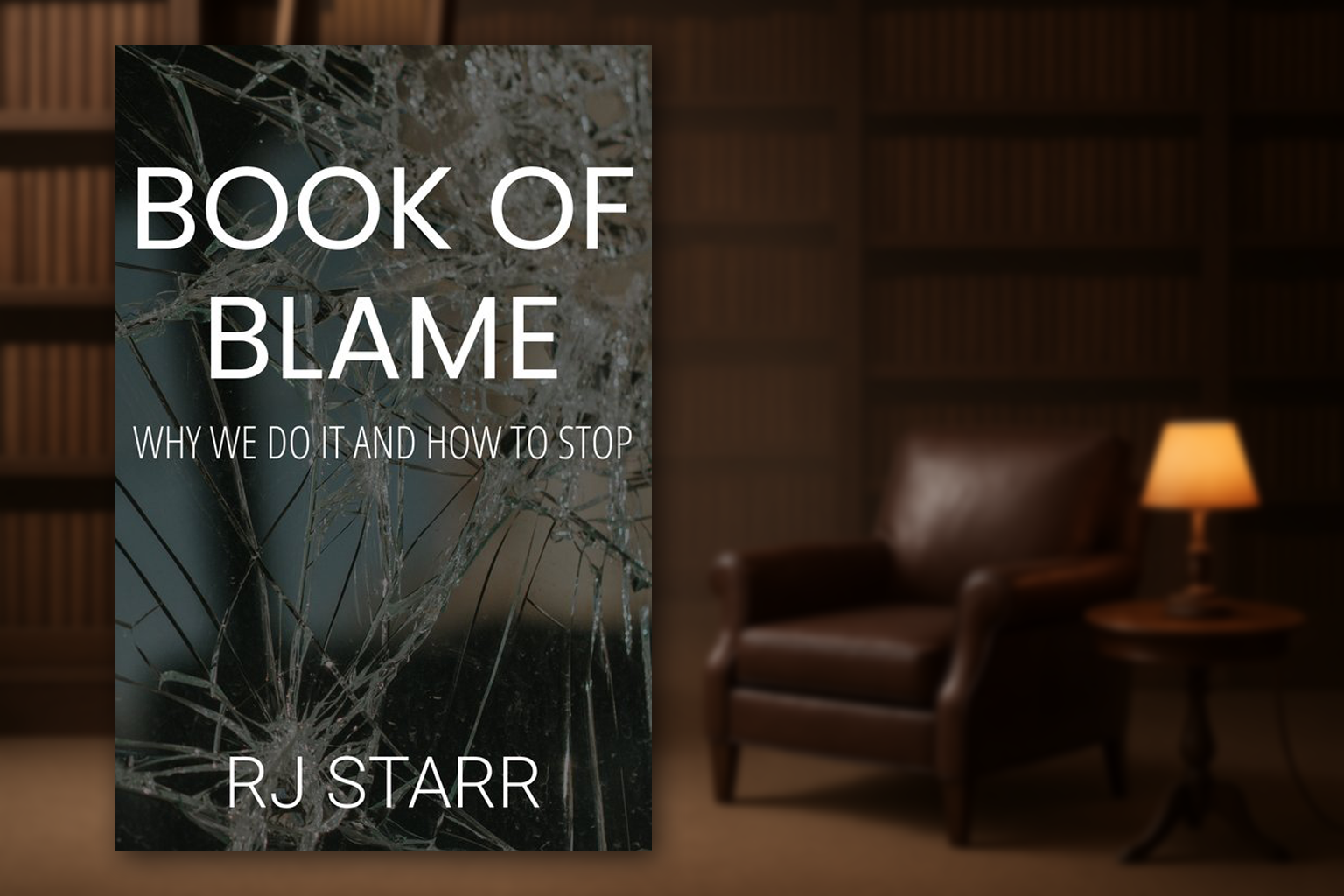
Exploring the architecture of mind, identity, and emotion—how people make meaning, regulate experience, and find coherence in a fragmented world. I write, teach, and publish to make psychology clear, grounded, and usable in everyday life.
Professor RJ Starr – Academic Psychologist and Author

Meet Professor RJ Starr
Academic Psychologist, Author, and Public Intellectual
Human understanding requires more than reflection; it requires learning to see others with the same clarity we seek for ourselves. My work explores how people construct meaning, regulate emotion, and preserve identity in a fragmented cultural world.
Drawing on existential psychology, cognitive science, and affective neuroscience, I write, teach, and publish to make psychological insight usable in everyday life. Through books, essays, podcasts, and an expanding library of resources, I offer frameworks that illuminate experience and cultivate the emotional maturity needed for connection, resilience, and coherence.
Alongside these works, several specialty series — Field Notes in Existential Psychology, Reader Questions, and More Than a Buzzword — bring these ideas into real conversation with readers. Each offers a different entry point into psychological understanding: reflective essays, reader questions, and cultural analyses that connect theory to the texture of everyday life.
Books
A profound exploration of what it means to stay human in the age of artificial intelligence. RJ Starr examines how awareness, empathy, and moral maturity—not technology—will define the future of intelligence. A work of public psychology that blends science, philosophy, and emotional insight to help readers remain conscious, balanced, and meaningfully human in a world shaped by machines.
Freedom promises fulfillment but often delivers anxiety. The Burden of Freedom explores why the power to choose can feel unbearable in modern life—and how responsibility, meaning, and psychological maturity can transform that weight into growth. A profound look at freedom, uncertainty, and the human mind.
The Psychology of Being Human offers a clear, emotionally grounded framework for understanding the mind, emotion, and meaning. Integrating decades of psychological insight, it explores identity, perception, regulation, and existential depth. This is not a guide for quick fixes—it’s a structured, usable model for making sense of complexity and reclaiming internal clarity in a fragmented world.
What if healing isn’t the goal? In this honest, psychology-informed reflection, RJ Starr explores why our obsession with self-improvement may be the very thing keeping us stuck. The Myth of Healing offers a powerful reframing of emotional growth—one rooted in permission, presence, and the radical idea that you’re not broken.
Why do we always feel behind, even when we’re doing everything right? The Psychology of Modern Inadequacy explores the emotional cost of self-optimization, burnout, and the endless performance of worth. This post introduces the book, its core questions, and why so many of us are quietly unraveling in plain sight.
This Is Us didn’t just entertain—it opened emotional doors. In this deeply reflective exploration, psychology professor RJ Starr unpacks how the Pearson family’s story reveals real-world truths about memory, identity, and love. This book is for anyone still carrying the show’s emotional weight.
Grey’s Anatomy isn’t just entertainment—it’s a psychological case study in trauma, grief, and identity. This post explores how the show captures emotional healing through its characters, and why their struggles resonate so deeply. If you’ve ever seen yourself in their pain, this book was written for you.
In After They're Grown, I explore the psychological and emotional shifts parents face when their children leave home. With psychological insights and practical strategies, this book helps you rediscover yourself during this transformative phase. It's a guide to embracing change, rebuilding identity, and finding purpose in the empty nest years.
What happens when life no longer looks familiar? Rebuilding Home After Everything Fell Apart is a companion for those quietly starting over—emotionally, psychologically, and spiritually. RJ Starr offers a grounded, reflective guide for those rebuilding from the inside out.
A practical, psychology-rooted guide to help you break free from constant mental loops. This book teaches why your brain spirals, how to ground yourself in the moment, and what to do when thinking becomes a trap. Includes real tools and rituals for finding peace without needing every answer first.
A psychology-based guide to self-awareness, identity, and emotional clarity. Seeing Ourselves Clearly helps you understand how your past shaped your present, and how to reconnect with who you truly are—beyond roles, habits, and expectations. Real tools and prompts support your return to a more grounded, authentic self.
Emotional intelligence is a daily practice, not a fixed trait. In The Emotionally Intelligent Life, psychology professor RJ Starr offers real-life tools for presence, accountability, and repair—helping readers grow into people who show up with clarity, care, and integrity when it matters most.
The Basics Still Matter is a heartfelt return to human truths we’ve forgotten in a fast, performative world. RJ Starr reminds us that presence, kindness, and emotional integrity still hold power—and that small, sincere acts are what truly sustain our relationships and sense of self.
Ghosting isn’t just silence—it’s uncertainty that unravels memory and identity. The deepest pain comes not from the disappearance, but from losing the chance to understand the story you thought you were writing with someone else.
Family, Fear, and the Final Fade to Black is a psychological portrait of the collapse at the heart of The Sopranos. Through trauma theory, family systems, and emotional survival, RJ Starr explores how the characters reveal the fragile selves we construct, protect, and sometimes lose.
The Psychology of Gilmore Girls explores identity, family, and emotional growth through the lives of Lorelai, Rory, and Stars Hollow. Blending psychological theory with character analysis, it reveals how the series mirrors our attachment styles, coping strategies, and longing for connection.
Managing Social Media Anxiety for Gen X offers a compassionate guide for navigating the emotional challenges of digital life. With humor and grounded psychology, it helps readers move beyond comparison, reclaim their presence, and redefine connection on their own terms.
Managing Social Media Anxiety: A Real Talk Guide for the Millennial Generation explores how curated digital life fuels self-doubt and anxiety. With honesty and practical tools, it helps readers move beyond comparison and reconnect with authenticity, purpose, and peace.
No Filter Needed explores why social media fuels anxiety and how to reclaim confidence and authenticity online. Through relatable stories and practical tools, this guide helps you set healthier boundaries, resist constant comparison, and remember that your worth was never up for likes.
This article explores the central themes of Have You Ever Seen Anyone Yelling at a Dog? by RJ Starr, examining emotional overreaction, impulse-driven behavior, and the psychology of misplaced frustration. It highlights key insights and practical strategies for emotional regulation and growth.
The Stories We Tell Ourselves by RJ Starr explores how personal narratives shape thoughts, emotions, and behavior. This book helps readers identify limiting beliefs, challenge old stories, and create empowering new narratives that lead to greater fulfillment, purpose, and growth.
The Psychology of Dawson's Creek: Love, Identity, and Growth in Capeside explores the emotional and psychological journeys of its characters through frameworks like Erikson’s stages and attachment theory, offering fresh insights into love, identity, and personal growth across adolescence.
The Gentleman's Way is a practical guide to living with integrity, grace, and purpose. Focusing on emotional intelligence, accountability, and self-discipline, it offers timeless insights for men seeking personal growth—and for women who wish to understand and support that journey.
Living with Purpose in a World Without Guarantees by RJ Starr offers a guide to building a life of authenticity and fulfillment amid uncertainty. Focusing on core values, resilience, and intentional living, it encourages readers to embrace the unpredictable and create meaning from within.
Conspiracy Theorists and Those Who Love Them by RJ Starr offers a compassionate guide to maintaining connection across differing worldviews. Focusing on empathy, emotional drivers, and practical tools like active listening, it helps readers navigate relationships without losing respect or understanding.
Public Outrage: Why Bad Behavior is on the Rise explores the psychological and cultural roots of increasing public incivility. Examining social media, disconnection, and declining etiquette, it offers solutions for fostering respect, emotional intelligence, and a more civil society.
The Power of Pivot by RJ Starr is a guide to embracing change, building resilience, and turning uncertainty into opportunity. With actionable strategies and insights, it helps readers develop the mindset, emotional intelligence, and leadership skills needed to adapt and thrive.
The Zen of Parrot follows Pepper, a playful and wise parrot, as he shares lessons on mindfulness, joy, patience, and presence. Blending humor with heartfelt wisdom, this book invites readers to slow down, savor everyday moments, and deepen their connection to themselves and the world.
Book of Blame explores why we blame others to protect the ego and avoid responsibility—and how this damages relationships and growth. RJ Starr offers practical tools for shifting toward accountability through communication, emotional regulation, and self-awareness.
Curating Your Inner Ecosystem is a guide to reclaiming emotional, mental, and physical well-being through intentional living. With practical tools and mindfulness practices, it helps readers nurture a balanced inner world, fostering greater peace, clarity, and purpose.
Latest Podcast Episodes
Recently Published Academic Papers
In a new paper, scholar RJ Starr introduces Adversarial Social Posture (ASP), a psychological framework for understanding the common tendency to perceive others as sources of inconvenience and frustration. Distinct from mere irritability or misanthropy, Starr argues ASP is a cognitive schema shaped by personality and the pressures of modern life that erodes personal well-being and social civility. The work explores the origins and societal consequences of this posture and proposes therapeutic pathways toward a more cooperative stance.
This blog post introduces my paper on Existential Compression, a construct that explains how overlapping pressures such as economic insecurity, illness, caregiving, isolation, and ecological precarity create a state of constriction. By linking psychological theory with cultural analysis, it clarifies why modern life so often feels overwhelming and why naming this experience matters.
-
Clarity isn’t about having fewer emotions. It’s about learning to hear the right ones.
-
We don’t escape our stories by ignoring them. We escape by naming the parts that still write us.
-
Resilience is not how quickly you move on, but how honestly you stay present with what happened.
-
Most people don’t fear change. They fear what will be asked of them once it arrives.
-
Self-awareness is not a mirror; it’s a doorway into how your choices shape tomorrow.
-
Maturity shows in what you no longer need to defend.
-
Avoidance gives temporary peace at the cost of permanent unrest.
-
Identity isn’t discovered once; it’s sustained through the stories we choose to keep telling.
-
Healing doesn’t mean becoming invulnerable. It means knowing where you are already whole.
-
The measure of intelligence is not complexity of thought, but clarity of meaning.

































